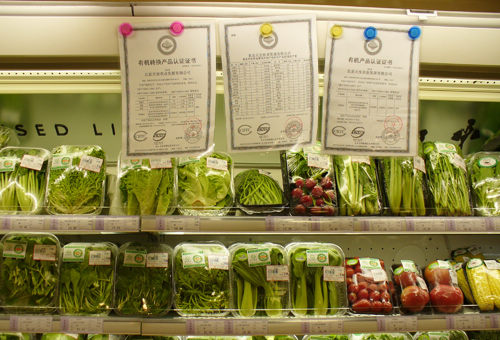|
 |
|
ORGANIC FOOD: Certificates of organic producers are displayed above a vegetable shelf in the Ganbei Supermarket in Beijing (WANG HAIRONG) |
Currently, 23 Chinese certifiers have been authorized to certify organic products for domestic consumption, whereas production for export is certified by foreign certifiers approved by China.
According to the CNCA, the new certification regulation differs from the previous one in that it has stricter certification standards on the production, processing, labeling and marketing of organic products. For instance, a certifying organization is required to conduct site inspections on all production activities at the organic production site in every production season for all products to be certified.
The new regulation also departs from the old one in spelling out that the certificates of dishonest producers shall be revoked or suspended in the event that the quality of their products does not meet national standards or prohibited substances are detected, and a revoked certificate cannot be restored for any reason.
Post-certification administration is a focus of market regulation. A certifying organization is required to make at least one post-certification on-site inspection of a certified producer. The certifier can determine the frequency of on-site inspections according to the type and risks of certified products, the quality of the producer's management system and the overall credibility of the locality.
Organic products are usually sold at prices much higher than regular items. This price difference offers an incentive for fraud.
Last October, investigations on fake organic products carried out by Xinhua News Agency reporters exposed misuse of certification marks in the Chinese market. Some producers use expired certification marks, some vendors label their non-organic products organic and some even use counterfeit organic certification marks. Liu Gang, an organic food broker who's been trading, processing and packaging organic food in Beijing, Shandong and Guangxi for years, said that an organic product certificate could be bought for between 20,000 yuan ($3,171) and 30,000 yuan ($4,756).
To make certification marks more difficult to tamper with, the new government regulation specifies that every certification mark should have a unique code, which should be put on the smallest package of certified organic products, so that the product can be traced and verified. The code should consist of the information of the certifying organization, the certifying year and some random numbers.
The CNCA also periodically inspects the market to crack down on illegal use of certification marks for organic products. According to the CNCA, in 2011, it inspected 845 vending venues and 1,610 certified producers and investigated 69 cases involving counterfeit organic certification marks.
Although the tight certification standards are intended to boost organic production, some argue the regulation will hinder small producers and prevent them from shifting to this green production model.
"The requirements in the new regulation for production environment, processes, material and scale are too strict for ordinary farmers, and the certification is also too expensive for them," said Ren Yuanyong, Director of the Agricultural Technology Promotion Center in Dongxi Town, Jianyang City in southwest China's Sichuan Province.
Nonetheless, Zhou at the Nanjing Institute of Environmental Sciences said that individual farmers can win consumers' trust with their reputation and good will instead of certification.
Pan Jiaen, an executive at the Little Donkey Farm in Beijing, agreed with Zhou. Pan said as an organic producer, the Little Donkey Farm would not seek certification, because annual certification is too expensive for small producers, and many counterfeit certified products have undermined the credibility of certification.
Shi Yan, founder of the Little Donkey Farm, encourages consumers to first visit her farm, to see the facilities and crops and to chat with local farmers about how it works.
Farmers at the Little Donkey Farm are required to follow the principles of organic farming, such as not using any synthetic fertilizer or pesticides. "Livestock should be fed with the farm's own grass and vegetables and not commercially produced animal feed," Shi said.
Email us at: wanghairong@bjreview.com | 